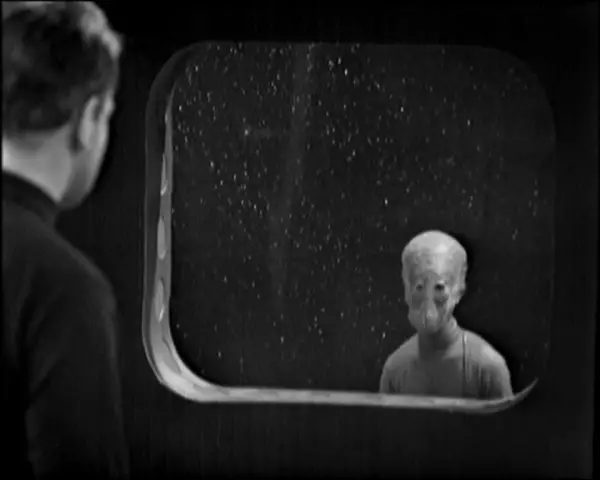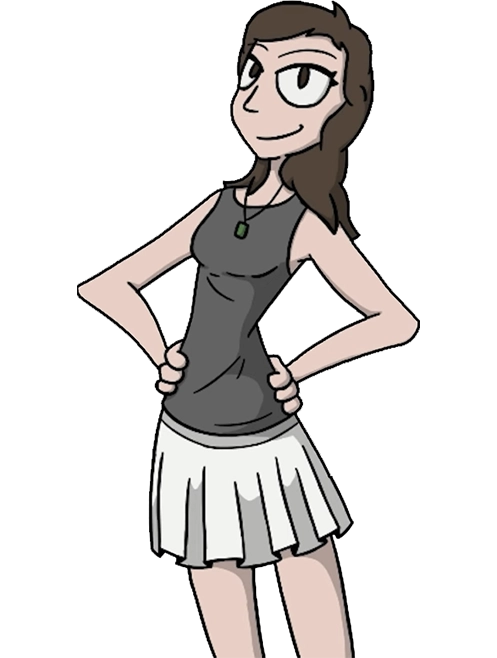Science fiction is a lovely genre because it can wrap great moral questions and challenges to social order up in stories about fuzzy, telepathic scrotum men. The Sensorites, named after said scrotum men, is a largely well meaning, archetypal sci-fi story, burdened by counterproductive minor conflicts and plot points. There’s something about Doctor Who, outside of it’s more standard 4 part structure, that always seems to have either too much story or not enough. This isn’t to say the 4 parters were all well paced gold, but the series has the nearly unique habit of rushing things when there’s not many episodes (or the modern single), and then dragging heavily when there’s more. So many other programs, particularly in the modern era, hit a basic but effective formula that fits the 45 or so minutes they have to work with but Doctor Who regularly strays one side or the other. The Sensorites is one of those others. It’s split into two main parts, half on a ship and half on the planet of Sense Sphere, and while each could have complimented the other, the writer almost willfully avoids this.
The TARDIS lands somewhere (which is going to be the start of 90% of these) and the crew notice that, even though they’ve landed, the readings say they are moving. What’s noteworthy here is that both Ian and Barbara contribute meaningful observations to the scene, which prompts a small discussion about the previous adventures and how much they’ve changed as a result. It skirts being a hamfisted piece of exposition by being light on details. Barbara’s experiences with the Aztecs are mentioned, for instance, but they’re not described like a personality power-up that have given her x ability. They are simply comfortable with the situation, as The Doctor and Susan are, and this nice little moment both bonds the characters and allows the stories to progress with the humans as active agents as opposed to suffering reluctants. This is a necessity the modern series doesn’t need because The Doctor can accurately fly Companion Girl home when needed. That actually created a new and interesting dynamic, that of The Doctor and his danger being almost like a drug, that The Power of Three and Face the Raven both started to explore before absolutely shitting the bed.
There’s a docudrama on the guy who managed to build a clock that works on boats. He got a docudrama about him because this was actually a really important invention, because it meant people could calculate longitude and actually make their boats get where they were supposed to go. The guy wasn’t a clock maker, though, rather a carpenter, which lead to some unusual quirks in the machine. If it was late or fast by even a second, it was as good as useless because that difference would multiply across the travelled distance so you’d wind up way off course. The road to building something that has never existed before is one of natural errors and this complicated device was no exception. What was exceptional was how these errors were dealt with. Instead of rebuilding it from the ground up with tweaks, he’d add more components to work against whatever error the machine had. The result was a demented monstrosity a thousand times more complicated than it needed to be.
There’s a lot of that in the The Sensorites, the plot does strange things and rather than rewrite it to tidy it up it just does further, stranger things to compensate. The TARDIS crew explore the ship they are on and find a room with what looks like dead people. The Doctor concludes, based on stopped watches, that these people have been dead for at least 24 hours, a fact that clashes with Susan’s noticing that the bodies are still warm. Wow! What a mystery. Naturally, First wants to leave immediately but one of the “corpses” stirs because it turns out they’re just in a form of deep sleep. First corpse, Maitland, explains that they’re being kept in a form of stasis by the Sensorites because they’ve gotten too close to their planet, Sense Sphere. First, Sense Sphere being the home of the Sensorites is one of those dumb sci-fi tropes that never seems to go away. It’s people naming the planet for the species without any consideration of the internal logic of the story. It’s like Earth being called “People Ball”. Secondly, the Sensorites won’t let them leave, but they won’t kill them. They just keep putting them to sleep over and over again using mind powers.
This is the show’s first dive into the idea of telepathy, so they needed to demonstrate that the Sensorites controlled minds but they also needed the story to move so the TARDIS crew are immune for no reason. The Doctor wants to leave these people to their eternal nightmare, again, which is the first example of the show unnecessarily working against itself. The character scene in the TARDIS was useful because it allowed the writers to skip the First Doctor’s story-disrupting habit of wanting to book it the fuck out of every situation he found himself in, which this story ignores to its detriment. While they do need a reason to not evacuate with the crew, the shown reason is a Sensorite stealing the TARDIS locking mechanism when the plot later says that there were no other Sensorites on board. The narrative could have used the TARDIS character scene to motivate The Doctor to stay and solve this problem. Instead it makes one error and then solves that with yet another.
Continuing this theme, the story goes out of its way to tell you that the crew have been in this limbo for a long time. Right now you are asking how they don’t starve to death. So was the audience, so we get told that the napping duo on the ship’s deck have distinct memories of the Sensorites feeding them. Right now you are asking how they took a shit. I don’t know. They didn’t cover that explicitly but the only available information suggests that the Sensorites took care of that too. This complication adds literally nothing to the plot at all. They could have actually been unconscious and only been there for a few hours. The Sensorites could have had them shut down the ships engines or deleted their memories. They had so many ways to not make me imagine how the Sensorites dealt with human poo-poos but the writer explicitly went out of his way to ensure that I did. Speaking of the writer, he’s actually a somewhat interesting bit of trivia by himself. Peter R Newman, this Michael York looking mystery, was so hard to find information on that there’s a documentary about the process.

Writing a plot that makes sense is hard when you’re focusing on getting enough of your comatose scat-fiction into a TV show that you can jerk off to it but not so much that you get caught. Maitland gets mind controlled and steers the ship at Sense Sphere. Yes, “at”, not toward. In fact, this scene ends with The Doctor stopping the ship from crashing and no suggestion that anything else would have happened had he not. I don’t know why or how this was a plan. If you trained Aikido for decades and used it to gracefully draw the fists of every passerby into your face it would indicate you have a better grasp of how to win a conflict than the Sensorites. The characters later muse on this and assume that the Sensorites were never going to actually crash the ship, but use fear to control people’s minds. The minds they already control. This is that longitude thing I was talking about, a clumsy added scene to correct what would have been a very simple change.
Now that they are close to the planet, some Sensorites make their way toward the ship. The story makes a point of having a high pitched whining noise indicate their approach, a daft physical impossibility that accomplishes nothing but highlight the fact that the Sensorite who stole the TARDIS lock was there when he shouldn’t be. This is making up for forgetting to wear your underwear by cutting a hole in the front of your pants. The Sensorites can also move through the vacuum of space just fine, which is an interesting idea that is never discussed again.

The Sensorites explain that the reason they’re doing this is because the ship crew discovered a valuable mineral on Sense Sphere and they fear human interference in their planet after the last human visitors brought with them a disease. That’s a natural fear, perfectly reasonable, so it makes sense that the Sensorites would want to ensure that they don’t have humans mucking about on their planet. The Sensorite solution to this is to bring the humans to their planet, as they’ve built some kind of enclosure for them. A bit like in Bioshock: Infinite when the people who were so racist they built balloon cities to get away from the black people but then also brought a population of black people, there was probably a better idea out there. The Doctor has no intention of being anyone’s pet and this moves the narrative to its primary conflict, issues of trust between species when each has a negative experience telling them not to trust the other.
This basic plot is a lovely sci-fi archetype and is really well executed when the story focuses on it. The ugliness of prejudice is explored but so is how the some of these prejudices are understandable as they are the results of traumatic life experiences. But this is again needlessly complicated by having the “disease” be a small group of feral humans living in Sense Sphere’s aqueducts periodically poisoning the water supply, which isn’t brought up until the final bloody episode. The antagonistic Sensorite’s hostility feels understandable when his perception of humans is based on a negative experience he believes lead to a disease that’s killing his people, and when humanity looks like a bunch of thugs compared to his gentle, telepathic kind. But this lasts too long in the face of all evidence around him and the advice of his own leader and people. Had the hostile human camp been made known at least an episode earlier, it adds a complication to the plot that supports the narrative and themes. Peace between peoples is hard when your niceness is interrupted by someone who looks like you flinging shit everywhere, and this human ugliness would have served the exploration of a more universal prejudice as the real villain. Instead they pop up 12 minutes from the end of the last episode then do nothing but look stupid and get caught.
There are a lot of constraints in making film or television that one doesn’t have so much in something like a book. These constraints are a very visible part of Doctor Who and it’s because of this that they are largely not a meaningful point of critique. The Sensorites makes a good counterpoint to The Aztecs because the latter dealt with its constraints where the former fails even within them. The most one could defend this story with is that is had to be 6 episodes to fill the season out, which is going to result in extra plot complications that one would be wise to otherwise avoid. But even within that, this story has added elements that work against itself. One of the problems with modern Who is it blazes through ideas without ever letting them sit for long enough to matter. It’s just shouted superlatives and magic fixes, but at least there’s the sense that it’s because the story is only 40 minutes. The Sensorites has the time which it uses only to punch itself in the face.
Why go out of your way to have the humans asleep for long enough to require feeding when not killing them at all would have demonstrated the Sensorite softness just as well? Why have the ship driven at the planet, when you could have had it piloted toward it, only to have to have the characters explain that the thing that you just drew the audience into was nothing after all? Why show that the characters have ways of telling when the Sensorites are around when that only points to a plot hole? Why have an antagonist’s hostility make perfect sense and then turn him into a villain, only to reveal a valid reason for his hostility he didn’t know about 12 minutes from the ending of your story? One of the worst modern examples that comes to mind is in The Robots of Sherwood, where Robin Hood has to shoot a gold arrow into a space ship to prevent it exploding in the atmosphere and destroying everything. There’s a million ways one could write this to have it make at least basic sense, but the story opted for there just being too much gold. It could have hit a gyro or something, anything, but they actively said the stupidest possible thing. There’s mistakes, and then there’s stupidity made measurable through how easy it would have been to avoid it. Like the gold, a few sentences fixes a lot of this and if your story is a few sentences short of making sense and you don’t add them, you’re shit.
Conclusion
Aside from a few visible booms, flubbed lines, and an audible production assistant, there’s little of the prototypical Doctor Who problems here. The sets and Sensorites all look reasonably good and there’s not too much scenery chewing so the process of watching it is hardly an embarrassing ordeal. The Sensorites themselves are also a good species, having a sense of culture a depth a bit beyond the kind of one-note alien cultures that litter science fiction. They have been mentioned as being somehow related to the Ood, though I’d rate that a kind of lazy afterthought based on similarities in appearance and telepathic ability. Aside from that, it’s a kind of story modern audiences will have seen a million times and this execution is so frequently faulty that there’s not much to recommend.
The next story, Reign of Terror, is missing bits and I can’t find a copy with the animated fillers so I’m skipping it. I think it’s about The Doctor going mad like Alec Baldwin’s character in The Shadow did and cruelly governing a bunch of Frenchmen or something. I dunno, check the fucking wiki, I’m tired and am still picturing Sensorite’s squabbling over who gets to wipe butt.




Comment on The Sensorites
To reply, please Log in